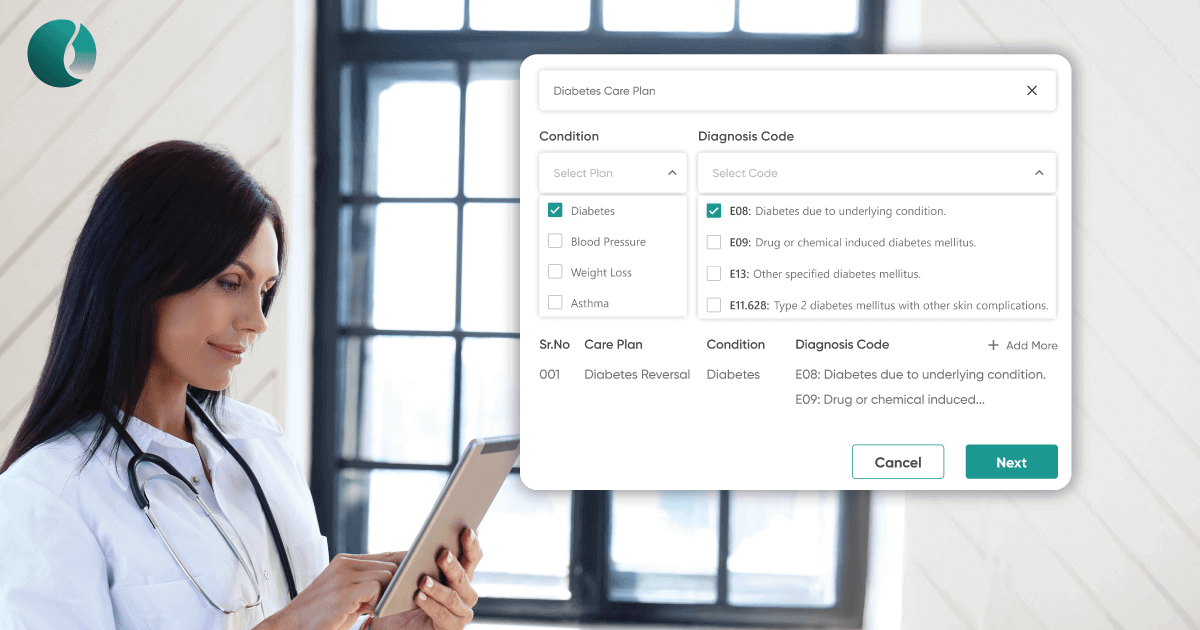Client Background
The Florida-based client aims to provide preventive care for patients who have diabetes to improve the lives of patients with better medical expertise and advanced technology. The client's primary goal is to benefit the patients by offering a wide range of services, including diagnosis, treatment, education, and ongoing support.
The client has around 1000 patients with diabetic illness and has limited resources to provide treatment to the patients for taking initial visits, regular follow-ups, and consultations.
Because of limited resources, it was difficult for clients to provide services to more patients and earn revenue. Hence, the client was looking for CCM software that promotes efficiency and personalized patient care using technology and advanced features.
Business challenges
The client used Athena EHR to manage their patient records regularly for diabetic patients. While using the EHR software, the client recognized that a one-size-fits-all approach would not produce estimated results in improving patient health. The client also identified the importance of personalized care for quick patient health recovery and patient satisfaction.
Some of the challenges the client faced while using the existing software are mentioned below:
1. Customizing Personalized Care Plans
The client was unable to customize care plans as per patient health requirements due to the missing functionality in the existing software.
2. Ineffective Patient Participation in the CCM Program
Diabetic treatment requires a prolonged duration; keeping the patient engaged and participating in the treatment plan was a significant challenge for the client. Also, the lack of patient engagment functionalities has affected the patient participation in the program.
3. Patient Health Assessment Challenges
Regularly assessing the patient's health is key to obtaining expected patient health outcomes. Lack of patient health assesment and evaluation functionalities in the client’s EHR software restricts them from delivering more enhanced, patient-centered care.
4. Promoting Patient Awareness of Chronic Diseases
The client did not have the educational material functionality within the software, which indirectly resulted in the patient's non-adherence to the prescribed care plan.
Solution
To overcome these challenges, the client approached Medarch INC. for chronic care management software with a patient-centered approach using advanced technology features.
Our team of business analysts and subject matter experts took multiple calls and demonstrations and understood the client’s requirements and challenges. Our team has implemented the eCareMD software in their practice based on the client's approval. After the implementation of the software, the client experienced the delivery of enhanced patient-centered care.
Solution Highlights
Below are major solution highlights that promote individualized patient-centered care, evaluate patient health, and educate patients.
1. Personalized/Customizable Care Plan

In chronic care management services, the assignment of the care plan plays an important role in providing effective treatment to the patient and producing expected outcomes. An accurate care plan fitting the patient's health condition and requirements derives better results.
The eCareMD platform allowed care providers to create and assign care plans considering the patient's needs. This included the patient's chronic conditions, goals setting, symptoms, timely interventions, care support, allergies, current and past medications, numbers to track, and expected outcomes.
eCareMD allowed the configuration of the care plan to meet all the patient's health condition requirements and align with their daily routine. It also enabled care providers to create and store the care plan in the platform library per the chronic conditions and customize those assessments per the requirements.
2. Shared Decision Making
The eCareMD platform enabled the Implementation of shared decision-making processes. This functionality involved and ensured patient participation during care planning over a system-generated telephonic call with the care manager.
This enhanced the participation of patients and providers while assigning care plans, enabling patients to choose their care treatment options and set goals. This active involvement of the patient helped to configure the care plan per the patient’s needs and preferences, keeping patients adhering to the assigned care plan.
3. Assessment for Patient Health Evaluation
The eCareMD platform enabled a series of assessments to be carried out by patients and care providers. It helped in the accurate, comprehensive evaluation of the patient's health condition and progress concerning the care plan assigned.
The assessments consist of questionnaires related to patient health, which could be emailed to the patient. Based on the patient's response, the care providers could analyze the results, configure the care plan, or take necessary action over the patient profile to obtain the expected outcomes.
4. Empowering Patients with Educational Materials
The eCareMD platform consists of the library as an educational repository. Using this, care providers can store educational material as per the specialty in various formats such as JPG, PDF, MP4, etc.
These educational materials could be sent to the patients over email, and patients can access that material to be aware of the diseases and get diet recommendations, set exercise schedules, and make changes in daily life routines. Proper implementation of prescribed recommendations from the educational material helps patients significantly improve their health.
Value Delivered
1. Customized Treatment Approach
The individually customized care plan facility ensures patients feel that their opinions and needs are considered. This results in increased patient confidence, satisfaction, and adherence to the patient care plan.
2. Enhanced Patient-Provider Relationship
The shared decision-making functionality while assigning care plans for the patient improves the relationship between the provider and the patient. It resulted in Improved patient experiences and positively impacted overall healthcare outcomes.
3. Improved Health Outcomes for the Patient
The continuous assessment of patient health enabled timely adjustments to care plans based on changes observed in the patient's condition or circumstances.
4. Enhanced Treatment Adherence
Easy access to educational material increases adherence rates as patients understand the importance of following prescribed regimens.

